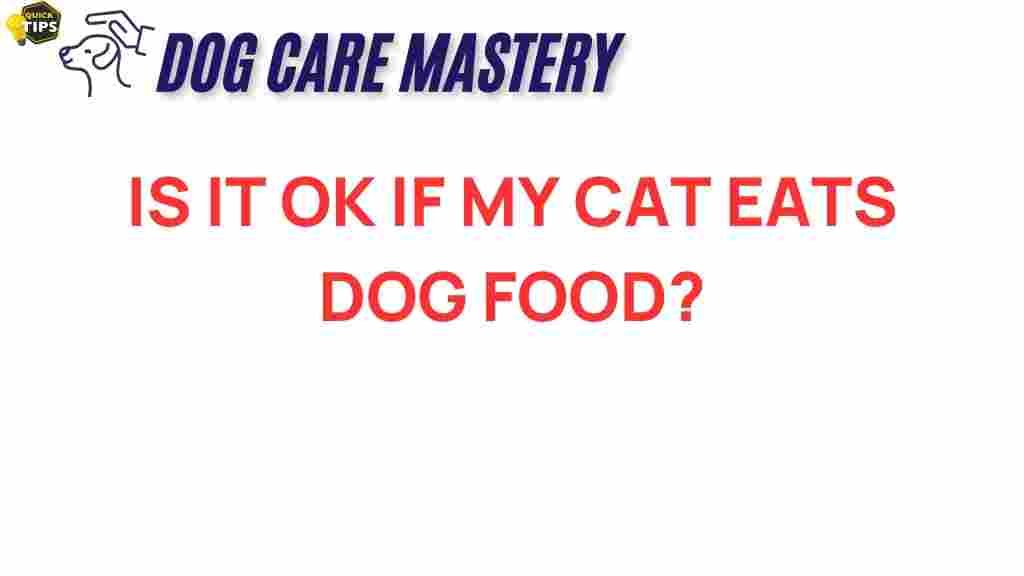Can Cats Safely Snack on Dog Food? Understanding the Cat Diet
As pet owners, we often find ourselves in situations where we question the dietary needs of our furry friends. One common query is whether cats can safely snack on dog food. While it may seem harmless to feed your cat a few bites of dog food, the underlying truth about a cat’s diet reveals some important considerations. In this article, we will explore the nutritional differences between cat food and dog food, the potential risks of feeding cats dog food, and how to ensure your feline friend stays healthy and happy.
The Importance of a Proper Cat Diet
Cats and dogs have different nutritional requirements. The primary reason for this difference stems from their evolutionary backgrounds. Cats are obligate carnivores, meaning their diet must consist primarily of meat. On the other hand, dogs are omnivores and can thrive on a more varied diet that includes both animal and plant-based foods. Here are some critical components of a cat’s diet:
- Protein: Cats require high levels of protein for energy and to maintain muscle mass.
- Taurine: This essential amino acid is vital for heart health, vision, and reproduction.
- Arachidonic Acid: A fatty acid that cats cannot synthesize and must obtain from their diet.
- Vitamins and Minerals: Essential nutrients that support various bodily functions.
Given these specific requirements, it’s clear that a cat’s dietary needs cannot be met by dog food alone.
The Nutritional Differences Between Cat Food and Dog Food
To further understand why a cat diet should consist primarily of cat food, let’s examine the key differences in nutrition:
- Higher Protein Content: Cat food typically contains more protein than dog food, which is essential for a cat’s energy levels.
- Essential Nutrients: Dog food often lacks certain nutrients that are crucial for cats, such as taurine and certain vitamins.
- Fat Content: The fat content in cat food is usually higher, which supports healthy skin and coat.
These differences underline the necessity of feeding your cat a diet specifically formulated for their needs.
Can Cats Eat Dog Food? The Risks Involved
While an occasional small amount of dog food may not cause immediate harm to your cat, there are several risks associated with regular consumption:
- Malnutrition: If a cat regularly eats dog food, it may lead to nutritional deficiencies over time, as dog food lacks essential nutrients.
- Health Issues: Long-term consumption can cause issues such as heart problems, vision issues, and skin disorders.
- Digestive Upset: Cats may experience vomiting or diarrhea if they eat dog food regularly due to their different digestive systems.
In summary, while snacking on dog food occasionally may not be dangerous, it is not advisable as part of a cat’s regular diet.
What to Do If Your Cat Eats Dog Food
If you discover that your cat has snacked on dog food, here are some steps to take:
- Monitor Your Cat: Keep an eye on your cat for any signs of digestive upset or unusual behavior.
- Hydration: Ensure your cat has access to fresh water, which can help alleviate any potential digestive issues.
- Consult Your Vet: If your cat shows signs of distress or if they have eaten a significant amount of dog food, consult your veterinarian for advice.
How to Transition Your Cat to a Healthy Diet
If you’re considering changing your cat’s diet or need to ensure they’re getting the right nutrition, follow these steps:
- Choose Quality Cat Food: Select high-quality cat food that meets the nutritional standards set by organizations such as the Association of American Feed Control Officials (AAFCO).
- Gradual Transition: When changing foods, mix the new cat food with the old food gradually over a week to prevent digestive issues.
- Monitor Feeding Portions: Ensure you are feeding the appropriate amount based on your cat’s age, weight, and activity level.
By making informed choices about your cat’s diet, you can help maintain their health and well-being.
Common Troubleshooting Tips for Cat Diet Issues
Sometimes, even the best-laid plans can go awry. Here are some troubleshooting tips if your cat is facing dietary issues:
- Refusing Food: If your cat refuses to eat, try warming the food slightly or mixing in some wet food for added appeal.
- Weight Issues: If your cat is gaining or losing weight unexpectedly, consult your vet to evaluate their diet and health.
- Digestive Problems: If your cat experiences diarrhea or vomiting, evaluate their diet and consider a visit to the veterinarian.
Understanding your cat’s dietary needs is crucial for their health, and taking the right steps can help avoid potential issues.
Conclusion: Prioritize Your Cat’s Diet
In conclusion, while it may be tempting to let your cat snack on dog food, the reality is that it can lead to serious health issues due to the differences in nutritional needs between cats and dogs. Prioritizing a proper cat diet is essential for your feline’s overall health, vitality, and longevity. Always ensure that your cat’s meals are balanced, nutritious, and tailored to their unique dietary requirements.
If you have any concerns regarding your cat’s diet or health, don’t hesitate to consult your veterinarian. Their expertise will help ensure that your furry friend stays happy and healthy for years to come. For more tips on pet care, check out our pet nutrition blog.
Remember, a well-fed cat is a happy cat!
This article is in the category Nutrition and created by dogcaremastery Team
